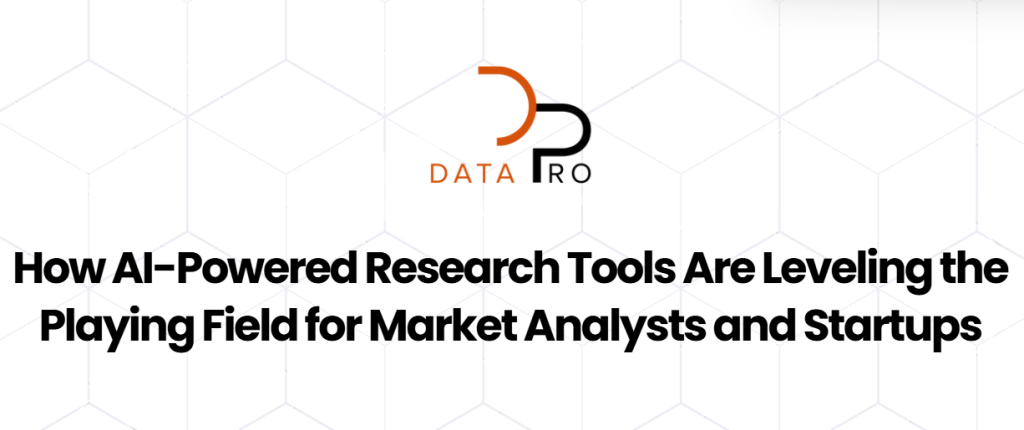
How AI-Powered Research Tools Are Leveling the Playing Field for Market Analysts and Startups
Artificial Intelligence (AI) is fundamentally reshaping industries across the globe, and its transformative impact on research and analysis is no exception. With the vast amounts of data now available and the need for insights in real time, AI-powered research tools are offering market analysts and startups unprecedented opportunities to compete with larger, more established players. Through advanced data analysis, automation, and insights generation, AI tools are empowering smaller businesses to make data-driven decisions, optimize their strategies, and scale effectively.
In this article, we will dive deep into how AI-powered research tools are leveling the playing field for market analysts and startups, enabling them to make smarter, faster decisions that drive growth and competitiveness in an increasingly data-driven world.
1. Why AI Matters for Market Analysts and Startups
For market analysts, startups often face the challenge of limited resources. From small teams to tight budgets, scaling research operations and delivering timely insights can be a daunting task. AI tools can alleviate these challenges by providing powerful, cost-effective solutions that address key pain points:
- Automation of Research Tasks: AI can take over time-consuming tasks like data collection, trend analysis, and report generation. This allows market analysts to focus on strategic decision-making instead of manual labor.
- Faster Decision-Making: With AI tools processing vast amounts of data at lightning speed, businesses can gain insights in real-time, making it possible to adapt strategies quickly and effectively.
- Increased Accuracy: AI tools eliminate human error and ensure a high level of accuracy when processing large data sets, providing more reliable insights.
- Cost-Effectiveness: By automating data analysis and simplifying complex research processes, AI tools help startups achieve more with less, providing a competitive advantage without significant financial investment.
AI gives market analysts and startups the ability to operate more efficiently, make better decisions, and compete on a global scale despite their size.
2. Key Areas Where AI Enhances Research Capabilities
1. Data Collection and Mining
AI excels at automating data collection from a variety of sources, including social media, news outlets, research papers, and industry reports. Tools like Crunchbase and CB Insights leverage AI to track market trends, funding rounds, and emerging startups. These tools aggregate vast amounts of data from various channels and process it in real-time, making it easier for analysts to gather critical market intelligence.
- AI-powered Data Aggregation: By analyzing vast pools of unstructured data, AI tools identify key data points that would be difficult or impossible to capture manually. This enables startups to track competitors, market shifts, and consumer sentiment in ways that were previously reserved for larger, more well-funded enterprises.
2. Market Research and Competitive Analysis
AI tools like Gartner and SEMrush use machine learning to provide in-depth market and competitive analysis. By leveraging AI, startups and analysts can access comprehensive reports and benchmarks without needing large research teams or expensive market research firms.
- Real-Time Competitive Intelligence: AI tools track competitors’ activities across various platforms, providing startups with up-to-date information on product launches, marketing campaigns, and customer reviews.
- Trend Analysis: AI-driven market research platforms can detect emerging trends before they become mainstream. This enables analysts and startups to make informed decisions about where to focus their efforts, be it in product development, content strategy, or market expansion.
3. Consumer Insights and Behavioral Analytics
Understanding consumer behavior is vital for both market analysts and startups to tailor their offerings. AI tools like HubSpot and Qualtrics help analyze customer data such as website interactions, social media behavior, and transaction history to extract meaningful insights that guide product development, marketing campaigns, and customer service strategies.
- Customer Segmentation: AI can divide customers into precise segments based on their behaviors, preferences, and purchasing patterns. This segmentation helps startups personalize their marketing efforts and target the right audience with the right message.
- Predictive Analytics: AI-powered predictive models, like those offered by Tableau and Google Analytics, help startups forecast customer behaviors, such as churn rates or future purchasing trends. This proactive approach to decision-making allows businesses to act before problems arise or capitalize on emerging opportunities.
4. Real-Time Data Visualization
AI tools help market analysts make sense of complex data through powerful visualization techniques. Platforms like Power BI and Tableau use AI to create interactive dashboards that display data trends and insights in real-time.
- Easy-to-Understand Visualizations: AI-generated charts and graphs help translate raw data into clear, actionable insights. This enables even non-experts to understand trends and patterns, improving decision-making and communication within startups.
- Customizable Dashboards: AI tools allow startups to customize their dashboards based on the most relevant metrics for their business, whether it’s social media engagement, customer acquisition cost, or sales performance.
5. Optimizing Research and Content Strategy
For startups looking to enhance their content strategy, AI tools like BuzzSumo and Frase.io offer insights into what content performs best in their industry. These platforms leverage AI to analyze search engine optimization (SEO), keyword ranking, and user engagement, giving startups an edge when developing content that resonates with their target audience.
- Content Gap Analysis: AI can help identify gaps in existing content and suggest topics that are likely to drive traffic and engagement based on current search trends and audience interests.
- Content Optimization: AI-driven tools analyze your existing content to suggest optimizations that improve SEO performance. This enables startups to compete with larger companies by improving the discoverability of their content without requiring large-scale content teams.
3. Implementing AI-Powered Research Tools in Your Startup
While the benefits of AI-powered research tools are clear, adopting them into your startup’s workflow requires a strategic approach. Here are key steps for implementing these tools:
1. Start with Specific Objectives
Clearly define what you hope to achieve with AI tools. Do you want to improve your competitive analysis, enhance customer insights, or optimize your content strategy? Understanding your specific goals will help you select the right AI tools and measure their success.
2. Select the Right Tools
Choosing the right AI-powered research tools depends on the needs of your startup. Some of the most commonly used tools in market research include:
- Data Aggregation: Crunchbase, CB Insights
- Market Research: SEMrush, Gartner
- Consumer Insights: HubSpot, Qualtrics
- Predictive Analytics: Tableau, Google Analytics 4
- Content Optimization: BuzzSumo, Frase.io
3. Train Your Team
Ensure your team is well-equipped to use AI-powered tools effectively. Many tools come with tutorials and resources to help users get started. Consider investing in AI training to maximize your team’s productivity and ensure they can fully leverage the potential of these tools.
4. Integrate AI into Existing Workflows
Seamlessly integrate AI tools into your existing systems. Many AI-powered platforms offer integrations with other software, such as Customer Relationship Management (CRM) or Content Management Systems (CMS), to streamline data sharing and enhance workflows.
5. Regular Monitoring and Optimization
AI is not a “set-and-forget” solution. Continuous monitoring and optimization of AI-powered research efforts are necessary to ensure that they remain effective and aligned with your objectives.
4. Overcoming Common Challenges with AI-Powered Research Tools
Although AI-powered research tools offer significant advantages, they also come with challenges:
- Data Privacy and Ethics: AI tools rely on vast amounts of data, so it’s essential to prioritize user privacy and comply with regulations like GDPR and CCPA. Ensure your tools adhere to ethical standards in data collection and usage.
- Learning Curve: Implementing AI tools can be overwhelming, especially for small teams. Start small with a single tool and expand as your team becomes more comfortable with the technology.
- Balancing Automation with Human Expertise: While AI can handle data analysis and research tasks, human expertise is still required to interpret results and make strategic decisions. AI should complement, not replace, human judgment.
5. Real-Life Example: AI in Action for Market Analysts
A market research firm used AI-powered competitive analysis tools like SEMrush to track the digital footprint of key competitors in the technology industry. By leveraging AI, they were able to identify emerging trends, content strategies, and new market opportunities. As a result, the firm improved its strategic recommendations to clients, which led to a 30% increase in client satisfaction and a 15% boost in new business acquisition.
6. The Future of AI-Powered Research
As AI technology continues to evolve, the capabilities of AI-powered research tools will expand even further. Upcoming trends include:
- Natural Language Processing: The ability for AI to process and understand human language will enhance research capabilities, allowing for more nuanced data analysis.
- Real-Time Predictive Analytics: AI will be able to predict trends and market shifts even faster, enabling startups to respond in real-time.
- Hyper-Personalization: AI will enable even more tailored recommendations and insights for startups, helping them create highly customized strategies for their target audience.
Conclusion
AI-powered research tools are no longer just a luxury reserved for large companies, they are an essential component of any startup’s strategy. By automating research, streamlining data analysis, and delivering actionable insights, these tools allow startups to compete at a higher level without the need for extensive resources. By carefully selecting the right tools, integrating them into workflows, and monitoring their effectiveness, startups can leverage AI to unlock new opportunities, make data-driven decisions, and fuel growth in an increasingly competitive market.
Innovate With Custom AI Solution
- 12 Courtyard Pl,
Lexington, MA 02420 - (617)319-0174
- corp@dataprocorp.tech
